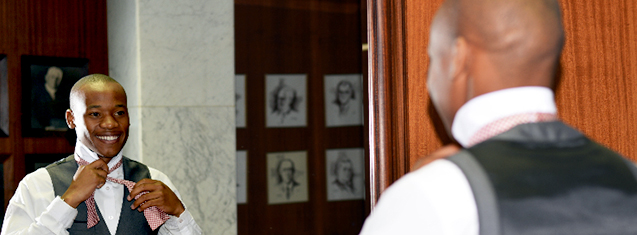
Lindokuhle Ntuli fulfils his promises.
“I can assure you that each and every promise that I’ve made to the students will be fulfilled.”
That is a promise that Lindokuhle Ntuli, SRC Legal and Constitutional Affairs (Bloemfontein Campus) gave to Kovsie students. The fourth-year LLB student and founder of the UFS Legal Behemoth describes himself as an ambitious person with a passion for law, order, and formality.
He explains the duties of his portfolio as “the office that will really ensure that the interests of all students are catered for. That student’s consumer rights are respected and not violated.” Through his portfolio, he aims to make sure that students are aware of what their rights are.
As part of his portfolio, Ntuli has re-introduced the Student Court, which will be fully functional during the second semester. The portfolio also introduced the Student Engagement Forum. The purpose of the forum is for students to share their grievances with regards to student rights violations. These discussions will take place twice a semester.
“The student engagement forum is the means by which we are able to really assess what kind of rights of the students are being violated,” Ntuli added.
Together with Louzanne Coetzee, SRC Accessibility and Student Support, Ntuli aims to establish the Student Rights Desk. The desk will deal directly with student rights on campus without recourse to the student court or external courts.
When asked about what his vision for the SRC is, Ntuli responded:
“My vision for the SRC is to see the SRC really attending to each and every need of students. We must advocate for students in the best way we can.”
And the words Lindokuhle lives by?
“Law and order exist for the purpose of establishing justice, and when they fail in this purpose, they become the dangerously structured dams that block the flow of progress” (Martin Luther King Jnr).